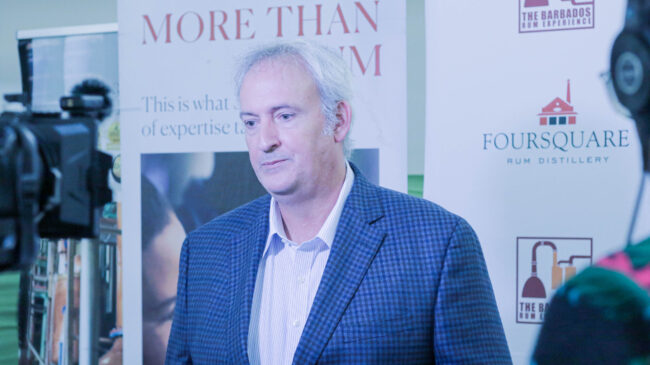The delay in the registration of a potentially lucrative graphical indication (GI) for Barbados rum is not sitting well with this island’s rum producers, who have been trying to get it in place for the past several years.
On Friday, master rum distiller and owner of Foursquare Rum Distillery Richard Seale argued that the delay was a result of authorities not understanding the importance of having the GI in place.
He said while he was not pointing any fingers, it was simply unsatisfactory and unacceptable that the industry was still awaiting approval of the trademark for several years from the Corporate Affairs and Intellectual Property Office (CAIPO).
“Government has never really understood it because we have lived off making sugar . . . Therefore, I don’t think they really take seriously, IP (intellectual property),” said Seale.
The first application to CAIPO for a GI was made by Export Barbados (BIDC) but was said to have required amendments and was subsequently abandoned following objections from a prominent distiller.
However, another application was submitted by three of the island’s rum producers in 2020. That, too, required some changes but they were not made aware of that until last year.
“So we responded accordingly [and] we have not heard anything since . . . . To date, three years, the application has languished in CAIPO,” Seale told those attending the rum panel discussion of the annual Barbados Rum Experience at the Radisson Aquatica Hotel.
“The seriousness of the issue is that it is not understood because Barbados simply does not have any experience and true understanding of selling to the world valuable, artisanal products. So they don’t grasp the concept that the more we invest in Barbados rum and the more valuable it becomes the greater the need to protect it.”
He said there continued to be concerns among local rum producers that there is no guarantee any rum overseas labelled ‘Barbados rum’ was actually from the island, and that the country continued to lose out on precious foreign exchange earnings as a result of the rum not being protected.
A GI is a sign that specifies that a project originated from a particular location, with the qualities, characteristics or reputation of the product depending on the place of origin of the product.
“The greater the value it has, the greater the exposure to exploitation . . . . As long as you create something of value, it will be exploited if you don’t protect it,” Seale told the gathering of international rum connoisseurs and specially invited guests.
Questions were raised by a former CAIPO employee about whether the delay at the government department was a result of a backlog as well as the need for more staff.
Seale said while there was no question those could have contributed to delays, “at the end of the day, if government is serious about protecting intellectual property, they will give the office the resources they need”.
Barbados TODAY understands that among the stipulations in the initial proposed GI are that rum distillers must use Barbadian water to make their rum and that the rum must be aged here.
Seale explained that the application submitted by three of the island’s rum producers was that Barbados rum be produced on the island “straight through to bottle”.
“In other words, there is no prescription on the methods to be used because one of the wonderful things about Barbados is that we have great diversity between our producers,” said Seale.
Foursquare had also submitted an application for a GI for Falernum in 2020, but Seale said they are yet to receive a response from CAIPO. (MM)




